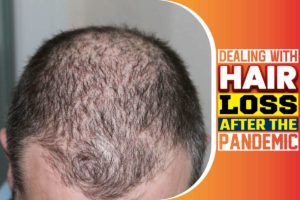Are you stressed out? Who can blame you? It’s been a nerve-wracking few years, to say the least. Many of us are still riding the course of the pandemic and quarantine, and it seems like the news adds something new to worry about every day into our lives. To keep ourselves calm and composed and avoid getting any more stressed over the things we certainly don’t have any control over, some try meditation and healthy diets by taking brain supplements from brands like ChemicalPlanet or Nootro Focus and avoiding junk food and alcohol. However, with stress and anxiety, our mental health is not the only thing suffering.
But with stress can also come hair loss.
Being in a high state of anxiety and stress, especially for a prolonged time, has been confirmed to be a contributing factor to hair loss, and these trying times would certainly qualify one of those periods. In addition, one of Covid-19’s lingering side effects can include hair loss.
So, while ‘pandemic hair’ referred to some as long and unruly locks between salon closures, to others, it meant the opposite: losing hair. If any of this applies to you, you may be looking to get your hair restored. Here are some methods to help fix thinning and balding hair.
Hair Restoration Surgery
Follicular Unit Extraction hair transplant is a cosmetic surgery that can provide a natural-looking solution to patterned baldness. The procedure is performed by harvesting healthy hair follicles from the back of the scalp, then implanted to the desired problem area. This procedure is considering non-invasive, and numbing is applied to reduce any pain.
Depending on the size and density of the designated area, the procedure can take between 4-10 hours.
In a 2016 study, the average satisfaction rate was 83% for patients three years after their FUE surgery.
Home Remedies
- Massage: Massaging the scalp can help stimulate and improve the thickness of your hair. Massages also help relieve tension, which may be the contributing factor to the loss, to begin with.
- Specialty Products: Shampoos, conditioners, and various other hair products all exist to help stimulate hair growth and increase the volume of existing hair.
- Holistic: A few natural remedies can help with hair loss, such as aloe vera and coconut oil. Aloe can help soothe scalps and open hair follicles blocked by excess oil. Coconut oil, on the other hand, contains fatty acids that can help penetrate the hair, reducing protein loss, which can lead to hair loss. Other natural products such as lemon, fish oil, rosemary, and ginseng can also help your hair.
- Vitamins: Vitamins play a big part in the health of your hair. Vitamin A helps your hair stay moisturized and grow, while Vitamin B helps oxygen and nutrients get to your scalp. Vitamin C helps produce collagen, which helps prevent the hair from ageing. Iron deficiencies have also been known to cause hair loss. Supplements for these can all exist and can contribute to healthier hair.
Laser Therapy
A relatively new approach, low-level laser therapy, or red-light therapy, irradiates photons into the scalp. This can help encourage growth by invigorating circulation and stimulating the scalp. This approach is considered less invasive than hair restoration surgery, however, as a newer approach, there is not much research done on this method, and results are relatively inconsistent.





















